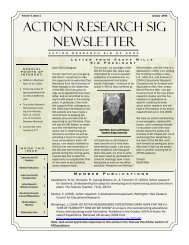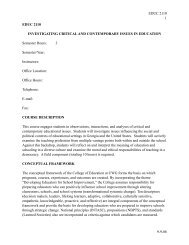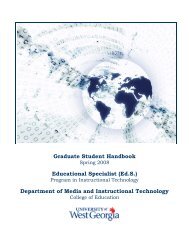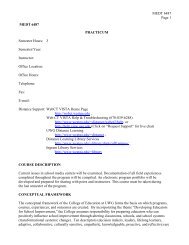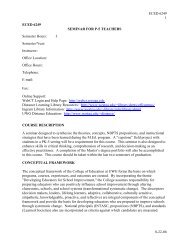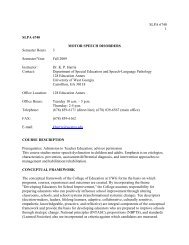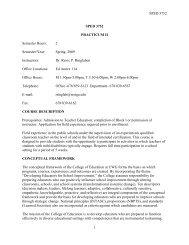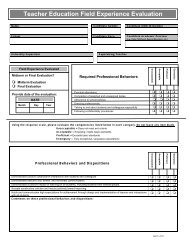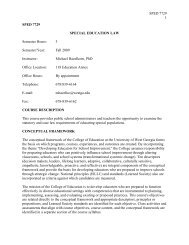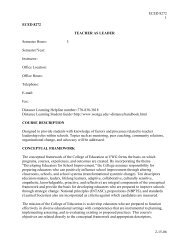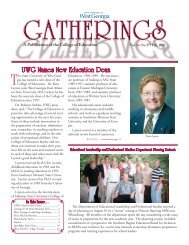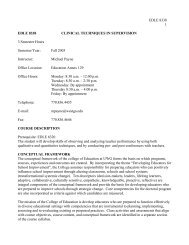ECED 4262 - College of Education
ECED 4262 - College of Education
ECED 4262 - College of Education
You also want an ePaper? Increase the reach of your titles
YUMPU automatically turns print PDFs into web optimized ePapers that Google loves.
<strong>ECED</strong> <strong>4262</strong><br />
Semester Hours: 3<br />
Semester/Year:<br />
Instructor:<br />
E-mail:<br />
Office:<br />
Office Hours:<br />
Telephone:<br />
TEACHING CONTENT AND PROCESS: SCIENCE EDUCATION<br />
<strong>ECED</strong> <strong>4262</strong><br />
1<br />
WebCT Login and Help Page: http://webct.westga.edu<br />
Distance Learning Library Resources: http://www.westga.edu/~library/depts/<strong>of</strong>fcampus/<br />
Ingram Library Information: http://www.westga.edu/~library/info/library/shtml<br />
UWG Distance <strong>Education</strong>: http://www.westga.edu/~distance/<br />
Georgia Department <strong>of</strong> <strong>Education</strong>: www.gadoe.org<br />
Georgia Performance Standards: www.georgiastandards.org<br />
National Science <strong>Education</strong> Standards: – www.nap.edu/html/nses/html<br />
COURSE DESCRIPTION<br />
Prerequisite: Admission to Teacher <strong>Education</strong>. All Courses from Block II. Must be taken<br />
concurrently with <strong>ECED</strong> 4251, MATH 4713, READ 4251, READ 4253. Students will examine<br />
content, methodology, skills and materials used to teach science to children in grades P-5 by<br />
means <strong>of</strong> course discussions and assignments, field placements/assignments, and course readings.<br />
Emphasis will be placed on developmentally appropriate practices and integration with<br />
mathematics and other appropriate subject areas.<br />
CONCEPTUAL FRAMEWORK<br />
The conceptual framework <strong>of</strong> the college <strong>of</strong> <strong>Education</strong> at the UWG forms the basis on which<br />
programs, courses, experiences, and outcomes are created. By incorporating the theme<br />
“Developing Educators <strong>of</strong> School Improvement,” the <strong>College</strong> assumes responsibility for<br />
preparing educators who can positively influence school improvement through altering<br />
classrooms, schools, and school systems (transformational systemic change). Ten descriptors<br />
(decision makers, leaders, lifelong learners, adaptive, collaborative, culturally sensitive,<br />
aesthetic, knowledgeable, proactive, and reflective) are integral components <strong>of</strong> the conceptual<br />
framework and provide the basis for developing educators who are prepared to improve schools<br />
8-23-06
<strong>ECED</strong> <strong>4262</strong><br />
2<br />
through strategic change. National principles (INTASC), propositions (NBPTS), and standards<br />
(Learned Societies) also incorporated as criteria against which candidates are measured.<br />
The mission <strong>of</strong> the <strong>College</strong> <strong>of</strong> <strong>Education</strong> is to develop educators who are prepared to function<br />
effectively in diverse educational settings with competencies that are instrumental to planning,<br />
implementing, assessing, and re-evaluating existing or proposed practices. This course’s<br />
objectives are related directly to the conceptual framework and appropriate descriptors, and<br />
principles are identified for each objective. Class activities and assessments that align with<br />
course objectives, course content, and the conceptual framework are identified in a separate<br />
section <strong>of</strong> the course syllabus.<br />
COURSE OBJECTIVES<br />
The students will:<br />
1. demonstrate the integration <strong>of</strong> physical, life, and earth science concepts relevant to<br />
elementary school science curricula (Martin, 2003);<br />
(Knowledgeable; INTASC 1, 2, 3, 4, 5, 6, 7, 8; ACEI 1, 2, 4, 5, 6, 7, 8, 12, 13, 14, 15, 16)<br />
2. select appropriate teaching strategies for teaching science skills, attitudes, and knowledge<br />
to elementary children (Martin, Sexton, Gerlovich, 2002);<br />
(Adaptive; INTASC 3, 8; ACEI 3, 8, 12, 13, 14, 15, 16)<br />
3. explain the developmental and cultural differences in children's thinking as it relates to<br />
science learning (Barba, 1998);<br />
(Adaptive, Empathetic, Knowledgeable; INTASC 1, 2, 3, 4, 5, 6, 7, 8; ACEI 1, 2, 3, 4, 5, 6,<br />
7, 8, 12, 13, 14, 15, 16)<br />
4. identify appropriate resources, materials, and technology for use with teaching science<br />
(Carin & Bass, 2001);<br />
(Decision Makers, INTASC 7; ACEI 7, 12, 13, 14, 15)<br />
5. explain the dominant views <strong>of</strong> science education and strengths and weaknesses <strong>of</strong> each<br />
view (Martin, 2003);<br />
(Knowledgeable; INTASC 1, 2, 3, 4, 5, 6, 7, 8; ACEI 1, 2, 4, 5, 6, 7, 8, 12, 13, 14, 15, 16)<br />
6. demonstrate ability to develop science lesson plans and units <strong>of</strong> study that reflect<br />
appropriate integration on other subject matter (Carin & Bass, 2001);<br />
(Collaborative, Knowledgeable; INTASC 1, 2, 3, 4, 5, 6, 7, 8, 10; ACEI 1, 2, 4, 5, 6, 7, 8,<br />
10, 12, 13, 14, 15, 16)<br />
8-23-06
<strong>ECED</strong> <strong>4262</strong><br />
3<br />
7. articulate the issues and strategies for teaching science to disadvantaged, minority, and<br />
special student populations (Martin, Sexton, & Gerlovich, 2002);<br />
(Culturally Sensitive, Empathetic, INTASC 1, 3, 8, 5, 6, 7, 10; ACEI 1, 3, 5, 6, 7, 8, 10, 12,<br />
13, 14, 15, 16)<br />
8. demonstrate positive scientific attitudes and interest in teaching and learning about the<br />
natural world (Friedl & Koontz, 2001);<br />
(Lifelong Learners; INTASC 1, 2, 3, 4, 5; ACEI 2, 7, 9, 12, 13, 14, 15, 16)<br />
9. demonstrate the ability to manipulate simple science equipment found in most elementary<br />
schools (National Research Council, 1996);<br />
(Knowledgeable; INTASC 1, 2, 3, 4, 5, 6, 7, 8; ACEI 1, 2, 4, 5, 6, 7, 8, 12, 13, 14, 15, 16)<br />
10. assess student learning in science through use <strong>of</strong> authentic means such as performance<br />
tasks, anecdotal records, and portfolios (Tippins, Koballa & Payne, 2002);<br />
(Reflective; INTASC 4, 9; ACEI 4, 9, 12, 13, 14, 15, 16)<br />
11. apply theories <strong>of</strong> learning in educational settings (Martin, 2003);<br />
(Adaptive; INTASC 3, 8; ACEI 3, 8, 12, 13, 14, 14, 15, 16)<br />
12. apply problem solving and decision making strategies to societal, scientific and<br />
technological issues (National Research Council, 1996); and<br />
(Decision Makers, Reflective; INTASC 1, 2, 3, 4, 5; ACEI 4, 7, 9, 12, 13, 14, 15, 16)<br />
13. teach a science lesson in their assigned field placement classroom (Carin & Bass, 2001).<br />
(Knowledgeable; INTASC 1, 2, 3, 4, 5, 6, 7, 8; ACEI 1, 2, 4, 5, 6, 7, 8, 12, 13, 14, 15, 16)<br />
TEXT, READINGS, AND INSTRUCTIONAL RESOURCES<br />
Required Text: Martin, D. J. (2006). Elementary science methods: A constructivist<br />
approach (4th ed.). Belmont, CA: Wadsworth/Thompson Learning.<br />
Knowledge and Research Base:<br />
Barba, R. H. (1998). Science in the multicultural classroom (2 nd ed.). Boston: Allyn and Bacon.<br />
Blough, G., & Schwartz, J. (1990). Elementary school science and how to teach it (8th ed.).<br />
Chicago: Holt, Rinehart and Winston, Inc.<br />
8-23-06
<strong>ECED</strong> <strong>4262</strong><br />
4<br />
Carin, A. A., & Bass, J. E. (2001). Teaching science as inquiry (9 th ed.). Upper Saddle River, NJ:<br />
Merrill Prentice Hall.<br />
Coucher, H. (1992, March). Outstanding science trade books for children in 1991. Science and<br />
Children.<br />
Doris, E. (1991). Doing what scientists do. Portsmouth, NH: Heinemann Press.<br />
Duckworth, E. (1991). The having <strong>of</strong> wonderful ideas and other essays. Columbia: Teachers’<br />
<strong>College</strong> Press.<br />
Estes, Y. (1993). Environmental education. Kappan. Bloomington, IN: Phi Delta Kappa.<br />
Friedl, A. E., & Koontz, T. Y. (2001). Teaching science to children: An inquiry approach (5th<br />
ed.). Boston: McGraw-Hill.<br />
Greene, L. (1991, October). Science centered curriculum in elementary school. <strong>Education</strong>al<br />
Leadership.<br />
Harlan, J. (1992). Science experiences for the early childhood years (5th ed.). New York:<br />
Macmillan Publishing Company.<br />
Lind, K. (1991). Exploring science in early childhood: A developmental approach. Albany, New<br />
York: Delmar Publishers.<br />
Martin, D. J. (2003). Elementary science methods: A constructivist approach (3 rd ed.). Belmont,<br />
CA: Wadsworth Publishers.<br />
Martin, R., Sexton, C., & Gerlovich, J. (2002). Teaching science for all children: Methods for<br />
constructing understanding (2 nd ed.). Boston: Allyn and Bacon.<br />
National Research Council. (1996). National science education standards. Washington, DC:<br />
National Academy Press<br />
Pomeroy, D. (1992, Fall). Exploring science across cultures. Cambridge: HGSE Bulletin.<br />
Tippins, D. J., Koballa, Jr., T. R., & Payne, B. D. (2002). Learning from cases: Unraveling the<br />
complexities <strong>of</strong> elementary science teaching. Boston: Allyn and Bacon.<br />
ASSIGNMENTS, EVALUATION PROCEDURES, AND GRADING POLICY<br />
Links to the Conceptual Framework: The focus <strong>of</strong> this course is on examining the content,<br />
methodology, skills and materials used to teach science to children in grades P-5 by means<br />
<strong>of</strong> course discussions and assignments, field placements/assignments, and course readings.<br />
Emphasis is placed on developmentally appropriate practices and integration with<br />
mathematics and other appropriate subject areas. The overall evaluation <strong>of</strong> this course is<br />
structured so that each assignment is aligned with achieving course objectives. Because <strong>of</strong><br />
the many objectives <strong>of</strong> this course, each conceptual framework descriptor is covered in<br />
course assignments. At the completion <strong>of</strong> the course, students will have demonstrated<br />
achievement in the areas <strong>of</strong> decision making by identifying appropriate resources,<br />
materials, and technology for use with teaching science and by applying problem solving<br />
and decision making strategies to societal, scientific and technological issues (Assignments<br />
3.0, 5.1, 5.2), knowledgeable by demonstrating the integration <strong>of</strong> physical, life, and earth<br />
science concepts relevant to elementary school science curricula, explaining the dominant<br />
views <strong>of</strong> science education and strengths and weaknesses <strong>of</strong> each view, demonstrating the<br />
ability to develop science lesson plans and units <strong>of</strong> study that reflect appropriate integration<br />
on other subject matter and demonstrating the ability to manipulate simple science<br />
equipment found in most elementary schools (Assignments 1.0, 3.0, 4.0, 5.1, 7.0).<br />
Students will demonstrate achievement in being adaptive by selecting appropriate teaching<br />
8-23-06
<strong>ECED</strong> <strong>4262</strong><br />
5<br />
strategies for teaching science skills, attitudes, and knowledge for elementary children, by<br />
explaining the developmental and cultural differences in children's thinking as it relates to<br />
science learning, and by applying theories <strong>of</strong> learning in educational settings (Assignments<br />
3.0, 5.1 5.2, 5.3), collaborative by demonstrating the ability to develop science lesson<br />
plans and units <strong>of</strong> study that reflect appropriate integration on other subject matter with<br />
other educators (Assignments 3.0, 5.2, 5.3 ), culturally sensitive and empathetic by<br />
articulating the issues and strategies for teaching science to disadvantaged, minority, and<br />
special student populations (Assignments 1.0, 3.0), lifelong learners by demonstrating<br />
positive scientific attitudes and interest in teaching and learning about the natural world<br />
(Assignments 1.0,3.0, 5.1, 5.2, 5.3), reflective by assessing student learning in science<br />
through use <strong>of</strong> authentic means such as performance tasks, anecdotal records, and<br />
portfolios (Assignments 2.0, 3.0, 4.0, 5.1, 5.2, 6.0)<br />
CLASS POLICIES<br />
1) Submitting Assignments. Students are expected to submit assignments on the due date.<br />
If you have any type <strong>of</strong> difficulty with the assignment, contact the pr<strong>of</strong>essor as soon as<br />
possible before the assignment is due. If an assignment is late and there has been no prior<br />
contact with the pr<strong>of</strong>essor, a grade reduction may be assigned. There is no provision in<br />
this course for extra credit nor will any work from other courses substitute for<br />
assignments. Use standard one inch margins and a 10 or 12 point standard font (i.e. New<br />
Times Roman). Guidelines for line spacing may be given for particular assignments, but<br />
if not specified, one and one half or double space. Include a header with your name,<br />
title <strong>of</strong> the assignment, and page numbers on all papers.<br />
2) Pr<strong>of</strong>essionalism: Students are expected to conduct themselves in a pr<strong>of</strong>essional manner.<br />
This is an essential quality for all pr<strong>of</strong>essionals who will be working in schools.<br />
Pr<strong>of</strong>essionalism includes, but is not limited to the following behaviors:<br />
i) Participating in interactions and class activities in a positive manner<br />
ii) Collaborating and working equitably with classmates<br />
iii) Turning in assignments on time<br />
iv) Arriving to and leaving class punctually<br />
v) Treating classmates, colleagues, and the instructor with respect in and out <strong>of</strong> the<br />
classroom<br />
vi) Eliminating interruptions in class including cell phones, beepers, talking out <strong>of</strong> turn or<br />
while others are talking, etc. Please turn <strong>of</strong> all cell phones and/or beepers during<br />
class.<br />
Students should also consult the Handbook for Field Experiences and Internship which<br />
has other requirements for conduct, dress, etc., while present in the schools.<br />
Students who display a lack <strong>of</strong> pr<strong>of</strong>essionalism will be contacted by the instructor and<br />
informed <strong>of</strong> the consequences. A second violation will result in departmental review, and<br />
the student may be removed from the program.<br />
8-23-06
<strong>ECED</strong> <strong>4262</strong><br />
6<br />
3) Attendance and Participation: It is imperative that you attend all classes. A portion <strong>of</strong><br />
your course grade is based on attendance and participation. You are allowed one<br />
absence with no grade penalty. Additional absences that are not excused* will result in a<br />
5 points per absence deduction from your attendance grade. You are allowed one tardy<br />
in excess <strong>of</strong> 15 minutes. Any additional tardies, regardless <strong>of</strong> the reason, will result in a<br />
5 point deduction from your final grade average for the class. See Number 1 under<br />
Assignments below. (Attendance and Participation are valued at 30 <strong>of</strong> 300 points for<br />
your class grade.)<br />
*Personal or immediate family (spouse, children) illness, death in immediate family are<br />
the only excused absences. A DOCTOR’S NOTE OR FUNERAL PROGRAM MUST<br />
BE PRESENTED TO YOUR PROFESSOR UPON YOUR RETURN TO CLASS.<br />
4) Communication: The <strong>of</strong>ficial means <strong>of</strong> communication is MyUWG email. This should<br />
be checked frequently even during Field Experience as this is the way that important<br />
information will be disseminated. WebCT Vista will also be used for assignments and<br />
other activities during the course.<br />
ALSO NOTE THAT ALL ABSENCES FROM FIELD EXPERIENCE MUST BE<br />
MADE UP BEFORE THE END OF THE SEMESTER.<br />
Assignments for <strong>ECED</strong> <strong>4262</strong> Teaching Content and Process: Science <strong>Education</strong><br />
1. Science Unit. Based on the standards taught during field placement, construct an<br />
integrated science unit from the unit plan developed prior to the Field Experience. The<br />
final integrated unit should include at least five science lesson plans. Details will be<br />
provided in class. Plan to teach the five lessons from the unit during field placement.<br />
Among other things to be included in the unit will be the pretest/posttest assessment, data<br />
collected from those, and analysis <strong>of</strong> the data.<br />
50 points Course Objectives 2, 4, 6, 7, 8, 9, 10, 11, 12, 13<br />
2. Understanding By Design Plan. Using the concepts <strong>of</strong> Understanding By Design and<br />
science standards, students will design an overall plan suitable for the grade he/she is<br />
assigned to teach during the Field Experience..<br />
20 points Course Objectives 1, 2, 5<br />
3. Lesson Plan, Assessment and Assessment Rubric. Prior to the FE, one lesson from the<br />
Understanding By Design Plan will be developed according to the lesson plan format<br />
provided in class. The assignment also includes development <strong>of</strong> an assessment and a rubric<br />
which can be used to formally evaluate student achievement. (For the Integrated Science<br />
Unit referenced below, a total <strong>of</strong> five such lesson/assessments will be developed.)<br />
20 points Course Objectives 1, 2, 4, 6, 7, 10<br />
4. Report <strong>of</strong> Pre/Post Test Assessment and Data Analysis. After determining the science<br />
standards to be taught in the field placement, outline the scope and sequence <strong>of</strong> the<br />
8-23-06
<strong>ECED</strong> <strong>4262</strong><br />
7<br />
concepts to be included. Design a test to be used as a pre-test and post-test (same test)<br />
when the science unit is taught. More details will be provided in class.<br />
10 points Course Objectives 2, 10<br />
5. Inquiry Lesson Reflection and Analysis. During the field placement, select a lesson<br />
taught during the science unit that indicates your understanding <strong>of</strong> inquiry based<br />
instruction. Write a reflection in which you describe the general focus <strong>of</strong> the lesson and<br />
where it seems to fall on the “Expository-Discovery Continuum.” Support your description<br />
with evidence based on what the teacher and students do during the lesson. Discuss the<br />
positive aspects <strong>of</strong> the lesson, any problem areas, and suggest improvements to the lesson.<br />
15 points Course Objectives 1, 2, 3, 4, 5, 7, 8, 9, 10, 11, 12, 13<br />
6. Questioning Lesson/Peer Observation Reflection and Analysis. During field placement,<br />
select a lesson to be taught during the science unit. Plan ahead <strong>of</strong> time to have a peer<br />
observe this lesson. The peer observer will record the number and types <strong>of</strong> questions used<br />
as well as the students to whom the questions are directed. Use the peer observations as<br />
well as your own impressions <strong>of</strong> the lesson to write a reflection. Include the general focus<br />
<strong>of</strong> the lesson, both your and the peer’s observations regarding questioning skills, and how<br />
the lesson can be improved.<br />
15 points Course Objectives 1, 2, 3, 4, 6, 7, 8, 9, 13<br />
7. Science Journal, Reading Assignments, Questions, etc. Reading assignments in the text<br />
and/or articles from pr<strong>of</strong>essional publications may be assigned with questions or other<br />
responses assigned for grading.<br />
25 points Course Objectives 1 – 13<br />
8. Inquiry Activity Presentation. Presentation <strong>of</strong> an inquiry science activity to this class as<br />
practice for using this in your FE. You are responsible for providing a handout,<br />
materials, and any safety protection needed to perform the activity with class<br />
participation.<br />
20 points Course Objectives 1, 2, 4, 6, 8, 9, 11, 12<br />
9. Pr<strong>of</strong>essional Science Websites Survey. Students will survey selected pr<strong>of</strong>essional<br />
websites for usefulness to the science classroom teacher.<br />
10 points Course Objective 4<br />
10. Science, Literature, Technology Project. This will be a project which integrates science,<br />
literature, and technology. Details <strong>of</strong> the project will be discussed after the FE.<br />
25 points Course Objectives 1, 2, 4, 6, 8, 9, 11, 12<br />
11. Portfolio Assessment. Demonstrate addition <strong>of</strong> your Unit Plan to a live, working portfolio<br />
site.<br />
15 points Course Objectives 1 - 13<br />
8-23-06
<strong>ECED</strong> <strong>4262</strong><br />
8<br />
12. Final Examination. A written final examination will measure your understanding <strong>of</strong><br />
strategies, resources, and classroom management practices necessary for effective science<br />
teaching.<br />
25 points. Course Objectives 1 - 13<br />
13. Field Experience Progress Reports. Weekly emails will outline your progress during the<br />
FE. Directions for submitting will be provided in class prior to the FE.<br />
25 points Course Objectives 2, 6, 8, 11, 13<br />
14. Attendance. See Attendance and Tardy specific requirements under “Class Policies”<br />
above.<br />
25 points Course Objectives 1, 2, 3, 4, 5, 7, 8, 9<br />
Performance evaluations during the Field Experience will be reviewed by Block<br />
III pr<strong>of</strong>essors based on field observations, attendance reports, and cooperating<br />
teacher evaluations. Successful completion <strong>of</strong> field experience is a minimum<br />
requirement for passing all methods courses. All absences during Field Experience<br />
must be made up prior to the end <strong>of</strong> the semester. If a student receives an<br />
unsatisfactory in the field experience portion <strong>of</strong> the course, this will result in an F<br />
grade for the all methods courses. (see University catalogue).<br />
SUMMARY OF ASSIGNMENTS, EVALUTIONS, AND GRADING<br />
Assignment Evaluation Method Total<br />
Pts.<br />
Date<br />
Turned<br />
In<br />
Attendance Points 25 -------<br />
Science Journal, Reading Checklist, Rubric, Points 25<br />
Assignments, Questions,<br />
etc.<br />
as appropriate<br />
Understanding by Design<br />
(UBD) Plan<br />
Rubric 20<br />
Lesson Plan, Assessment,<br />
20<br />
Evaluation Rubric<br />
Rubric<br />
Inquiry Presentation Rubric 20<br />
Science Unit Rubric 50<br />
Report <strong>of</strong> Pre/Post Test<br />
Data<br />
Inquiry Lesson Reflection<br />
Checklist 10<br />
and Analysis<br />
Questioning Lesson and<br />
Rubric<br />
15<br />
Reflection<br />
Pr<strong>of</strong>essional Science<br />
Rubric<br />
15<br />
Websites Survey<br />
Science, Literature,<br />
Checklist<br />
10<br />
Pts.<br />
Assigned<br />
8-23-06
<strong>ECED</strong> <strong>4262</strong><br />
9<br />
Technology Project Rubric 25<br />
Portfolio Assessment Rubric 15<br />
Final Exam Rubric/Points 25<br />
FE Progress Reports Report <strong>of</strong> FE Supervising<br />
Teachers and University<br />
Supervisor<br />
25 -------<br />
Total Points 300 /300<br />
GRADING POLICY: Total Course Points = 300<br />
A = 270 – 300 pts B = 240 –269 pts C = 210 – 239 pts D = 180 – 209 pts F = less<br />
than 180 pts<br />
COURSE OUTLINE AND CALENDAR<br />
<strong>ECED</strong> <strong>4262</strong>-01<br />
DATE<br />
AUG. 15<br />
AUG. 22<br />
AUG. 29<br />
SEPT. 5<br />
SEPT. 12<br />
SEPT. 18 –<br />
OCT. 20<br />
CLASS ACTIVITIES<br />
Introductions/Course design/Pre-Survey<br />
What is “science”? Who is a “scientist”?<br />
Science Journal<br />
Activity: Inquiry and Science Processes<br />
What is “constructivism.? Preview <strong>of</strong><br />
textbook/Ch. 1 & 2<br />
Student misconceptions; cognitive development<br />
Bloom’s Taxonomy; questioning techniques<br />
GPS/Intro UBD<br />
Inquiry Lab<br />
Develop sample UBD plan<br />
UBD assignment and Review Time<br />
Inquiry Lab<br />
Assessment/Evaluation<br />
Discuss inquiry lesson presentations<br />
Continue UBD with lesson plans<br />
Discuss Science Unit /related requirements<br />
Safety in the science classroom (Ch. 8)<br />
Collect UBD, one lesson plan, one rubric<br />
Inquiry lesson presentations<br />
ASSIGNMENTS (WHAT IS DUE<br />
NEXT CLASS MEETING?)<br />
Read Chapters 3,4 with Questions<br />
Article/Questions<br />
Print copy <strong>of</strong> K-5 Science GPS<br />
Chapter 5/Questions<br />
Annenberg video/Questions<br />
Develop UBD plan through #5<br />
Print copy and review Science Unit<br />
booklet<br />
UBD Plan, one lesson plan, one<br />
rubric<br />
Prepare inquiry lesson presentation<br />
Weekly emails regarding FE<br />
See Syllabus - other assignments<br />
during FE.<br />
Due on Oct. 24: Inquiry Reflection,<br />
Questioning Reflection<br />
Field Experience – no class meetings Weekly emails regarding FE<br />
See Syllabus - assignments to be<br />
completed during the FE.<br />
Due Oct. 24: Inquiry &Quest.<br />
Reflections<br />
Debriefing <strong>of</strong> FE; FE Survey Unit Plan and Pre/Post Survey–<br />
8-23-06
OCT. 24 Collect Reflection Papers<br />
Discuss completion <strong>of</strong> Integrated Unit Plan<br />
OCT. 31<br />
Diverse Students<br />
Pr<strong>of</strong>essional organizations and resources (Ch.<br />
12)<br />
Speaker - GYSTC<br />
NOV. 7 Collect Unit Plans and Pre/Post Survey<br />
Resource speaker (NASA)<br />
Discuss Science, Literature Project<br />
Collect Science Websites Survey<br />
NOV. 14<br />
<strong>ECED</strong> <strong>4262</strong><br />
10<br />
Due Nov 7<br />
Prepare for Sci, Lit, Tech Project<br />
Chapter 6/Questions<br />
Chapter 9/Questions<br />
Review NASA website<br />
Pr<strong>of</strong>essional Science Websites<br />
Survey<br />
Review GYSTC website<br />
Finalize portfolio – Due 11/21<br />
Web CT assignment<br />
Prepare for Sci,Lit. Project<br />
NOV. 21 Portfolio Due<br />
NOV. 28 Science, Literature, Project<br />
Course evaluation<br />
Post Attitude Survey<br />
Prepare for Final Exam<br />
DEC. 5 Final Exam Good Luck in Block IV!<br />
Students are expected to adhere to the highest standards <strong>of</strong> academic honesty. Plagiarism<br />
occurs when a student uses or purchases ghost-written papers. It also occurs when a student<br />
utilizes the ideas <strong>of</strong> or information obtained from another person without giving credit to that<br />
person. If plagiarism or another act <strong>of</strong> academic dishonesty occurs, it will be dealt with in<br />
accordance with the academic misconduct policy as stated in The Student Handbook,<br />
Undergraduate Catalog, and Graduate Catalog.<br />
8-23-06



